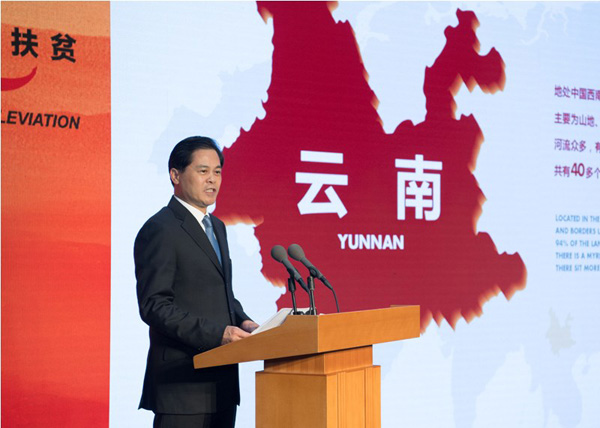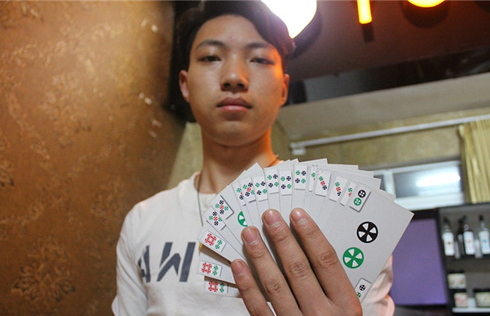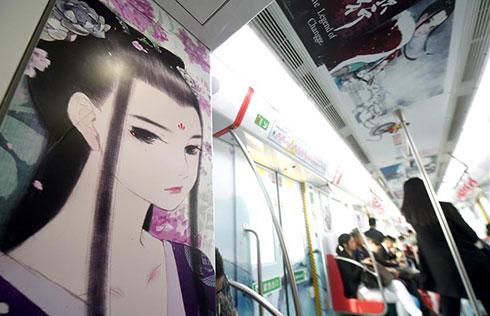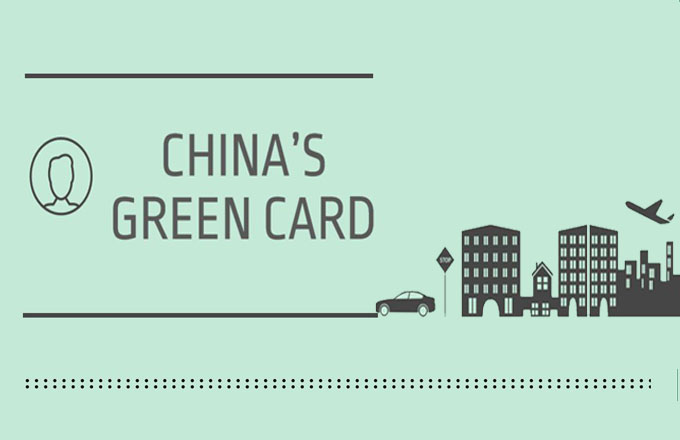Xi's poverty alleviation drive helps ethnic groups in Yunnan
 |
|
Chen Hao, Party chief of Yunnan province, delivers a speech at a promotion meeting on April 27, 2017. [Photo/idcpc.gov.cn] |
Chinese President Xi Jinping's ideas and strategies to govern the country, especially those targeting poverty alleviation, have greatly benefited ethnic groups in southwestern China's Yunnan province, new figures show.
Of the 8 million people living in poverty in the southwestern province in 2012, more than 4.4 million had improved their situation by the end of 2016, Yunnan Party chief Chen Hao said on Thursday.
Chen released the figures at a promotion meeting hosted by the International Department of the CPC Central Committee in Beijing where Yunnan's poverty alleviation measures were shared with visiting foreign parties, ambassadors and diplomats.
Bordering Myanmar, Laos and Vietnam, the population of Yunnan is 43 million, of which 25 ethnic minorities make up over 15 million. It has vast mountainous areas identified as key targets for poverty alleviation.
President Xi has made a solemn commitment that by 2020 China builds a moderately prosperous society in an all-round way with all poor, rural populations to be lifted out of poverty and impoverished areas of all counties are removed.
When Xi visited the quake-hit and poverty-stricken areas in the province in 2015, he pledged that "in building a moderately prosperous society in an all-round way, no ethnic group shall be left behind."
Chen said that the CPC Yunnan Provincial Committee has learned and followed Xi's calls to support the development of ethnic minorities while unifying ethnic groups as part of the poverty alleviation campaign.
The measures include emphasizing strong leadership, enhancing overall planning, implementing tailored measures and increasing funding, according to Chen.
Help from ministries and national committees, eastern cities and provinces such as Shanghai and Guangdong, as well as some enterprises, institutions and social organizations have been instrumental in poverty alleviation.
A responsibility system of leading cadres level-by-level from province, city, county, township to village has been well established in the poverty alleviation campaign, Chen said.
Tong Zhiyun, Party chief of Nujiang Lisu autonomous prefecture, listed some detailed measures, such as building traffic infrastructure, power and water conservancy facilities, cultivating industries, building homes and providing training.
To address the various factors that cause poverty, Zhai Yulong, Party chief of Zhenxiong county in Zhaotong city, said that tailored measures were undertaken, such as "vocational education to solve the poverty caused by people's minds."
Liu Kaiming, Party chief of Pojiao village in Lincang city, said that he had remembered every villager's situation and spoke of a recent visit to three villagers who are migrant workers in Beijing.
Yunshan village in Lancang county has started planting potatoes in recent years, local villager Jiang Yulan said. The move has seen villagers' income jump to 10 times what they make from planting corn.
"Yunnan's practices have shown that firm determination and strong political leadership are crucial (in poverty alleviation)," Javier Miranda, president of Broad Front in Uruguay, said at the promotion meeting after a recent visit to Yunnan.
Mark van den Boogaard, senior policy advisor from Global Cooperation of UNDP, said that he was impressed by the CPC's comprehensive guidance and the joint efforts of society in the poverty alleviation work.
Yunnan has proved the poverty alleviation model used by the CPC with Chinese characteristics is gaining great achievements, Song Tao, head of the International Department of the CPC Central Committee, said.
The CPC would like to exchange experiences in poverty alleviation with foreign parties and people, contributing wisdom and strength to global governance, Song said.



















